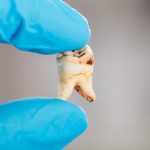The Life of Your Smile – How Age Impacts the Health of Your Teeth
Written by Consumer Guide to Dentistry Last modified on December 19, 2018
Getting older has many benefits. Of course, with everything in life, there are trade-offs. As we age, the body needs more tending to, the teeth and oral health being no exception. Over time we become more susceptible to dental disease and various other dental health issues. Fortunately, there are steps that we can take to maximize the longevity of a healthy smile. In this edition of our blog, Consumer Guide to Dentistry wants to set the record straight on the potential impact that aging can have on oral health, and some steps you can take to minimize the impact of aging.
Increased Risk of Decay

One of the big red flags for oral health due to Father Time is the increased risk of tooth decay. Although we typically think of high-sugar diets and poor oral health as being the primary causes of tooth decay, the increased risk associated with age is tied indirectly to dry mouth. Saliva plays an essential role in helping to maintain a healthy pH balance in the mouth and preventing the buildup of tooth-attacking bacteria. (Checkout 5 essential benefits of saliva.)
So what’s the connection between dry mouth and age? Medications. The older we get, the more likely we are to need prescription medications. Dry mouth is a common side effect of many medications, thus putting us more at risk for tooth decay.
Speak with your dentist and/or doctor to discuss alternative medications that may not cause dry mouth. If you don’t have alternative options, there are other steps you can take to mitigate the effects of dry mouth.
Gum Recession
Ever heard the expression “long in the tooth?” It’s a colloquialism often used to refer to an older person. Its derivation actually relates to a common oral health issue called gum recession. A consequence of poor oral hygiene is the buildup of tartar along and under the gum line. Over time, this can eat away at healthy gum tissue and lead to recession. As the gum tissue recedes, the teeth appear longer.
Practicing good oral health throughout your life, maintaining regular dental visits, and brushing with a soft bristled brush are the best methods for safeguard gum health. But don’t get too carried away. Over-exuberant brushing and flossing can have a negative effect and lead to recession as well. Moderation, moderation, moderation.
Changing Facial Anatomy
A consequence of time and gravity is that facial appearance and anatomy can shift. Wrinkles and sagging skin are tied to aging because we’re no longer producing the same levels of collagen, which plays the essential role in youthful appearance. This lack of collagen can also cause the dental arches to become narrow, leading to crowding of the teeth. The loss of collagen and the resulting teeth crowding usually begins in the 30s or 40s and can interfere with bite alignment, and cause excessive wear and tear. Daily hygiene practices like brushing and flossing can be more difficult, increasing the risk of bacteria and tartar buildup. Crowding can also lead to an increased risk of damage through chips or cracks in the teeth.
Although you might associate orthodontics with teenagers and a mouthful of braces, there have been significant advancements making treatment a more attractive option for older adults looking to correct teeth crowding and alignment issues. A relatively minor correction can improve alignment and shave years off your smile.
The General Health Connection and the Bottom Line
Take care of your teeth and your teeth will take care of you. Oral health shares a direct connection with general health. Tooth decay and gum disease put you at greater risk for serious general health conditions like cancer and cardiovascular disease.
As we get older, there are inevitable smile-altering changes that must be adapted to. Being aware of these changes and actively working to offset them through the best dental hygiene, diet and nutritional practices can help reduce their impact and maximize the life of your healthy smile.
For more information about how best to protect your smile, speak with your dentist sooner rather than later about how aging will impact your oral health.
You can also check out some of our related articles:
Oral Health and the General Health Implications
Nutrition Tips for Good Oral Health
Sources:
The aging mouth – and how to keep it younger – Harvard Health Publishing – Jan, 2010
Aging and Dental Health – Mouthhealthy.org – American Dental Association






